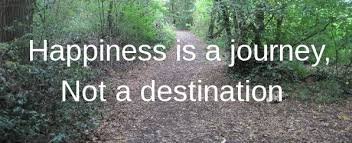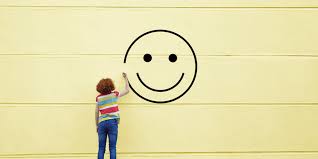
When I had this question I did the wrong thing to find the answer. Yeah. the wrong thing. What was the wrong thing ?
I googled the question.
First, a dictionary has defined happiness as the state of being happy. (when i was searching for what is happiness, it made another question in my head asking what is "happy" means ?)
Another article (https://greatergood.berkeley.edu/topic/happiness/definition) had to say this below.
Most of us probably don’t believe we need a formal definition of happiness; we know it when we feel it, and we often use the term to describe a range of positive emotions, including joy, pride, contentment, and gratitude.
But to understand the causes and effects of happiness, researchers first need to define it. Many of them use the term interchangeably with “subjective well-being,” which they measure by simply asking people to report how satisfied they feel with their own lives and how much positive and negative emotion they’re experiencing. In her 2007 book The How of Happiness, positive psychology researcher Sonja Lyubomirsky elaborates, describing happiness as “the experience of joy, contentment, or positive well-being, combined with a sense that one’s life is good, meaningful, and worthwhile.”

Acacia Parks, Ph.D is Assistant Professor of Psychology at Hiram College had to say the below long passage about happiness (https://www.happify.com/hd/what-is-happiness-anyway/)
People have agonized over this question for centuries, but only recently has science begun to weigh in on the debate. Before I get into what the science has concluded, let me start by giving some answers to a somewhat easier question: what isn’t happiness?
Happiness is Not: Feeling Good All The Time
Skeptics have often asked whether a person who uses cocaine every day is “happy.” If feeling good all the time were our only requirement, then the answer would be “yes.” However, recent research suggests that an even-keeled mood is more psychologically healthy than a mood in which you achieve great heights of happiness regularly—after all, what goes up must come down. Furthermore, when you ask people what makes their lives worth living, they rarely say anything about their mood. They are more likely to cite things that they find meaningful, such as their work or relationships. Recent research even suggests that if you focus too much on trying to feel good all the time, you’ll actually undermine your ability to feel good at all—in other words, no amount of feeling good will be satisfying to you, since what you expect (all the time) isn’t physically possible for most people.
Happiness is Not: Being Rich or Affording Everything You Want
While living below the poverty line certainly makes it hard to be happy, beyond that, money does not appear to buy happiness. Imagine you unexpectedly get a $10,000/year raise. While you would certainly be excited in the short term, it would only be a matter of time before your expectations change to fit your new budget. Before you know it, you’re just as happy as you were before the raise! This holds true for new houses, new cars, new gadgets, and all of the other material goods that people spend so much time pining for. The only exception to this rule is when you spend your money on experiences with other people so if you took that extra $10,000/year and spent it on some weekend getaways to new and exciting places with your friends or family, then you might get happier. However, this is rarely how people choose to spend windfalls.
Happiness is Not: A Final Destination
The old adage, “Are we there yet?” is often applied to discussions of happiness, as if a person works towards happiness and one day “arrives.” Contrary to popular belief, however, unless you are one of the few who won the genetic lottery and are naturally happy, it takes regular effort to maintain happiness. Most established techniques for becoming happier—keeping a gratitude journal, for example—are habits, not one-shot events, and most life events that make us happy in the short-term, like getting married or being promoted, fade over time as we adapt to them.
So, What IS Happiness?
The research suggests that happiness is a combination of how satisfied you are with your life (for example, finding meaning in your work) and how good you feel on a day-to-day basis. Both of these are relatively stable—that is, our life changes, and our mood fluctuates, but our general happiness is more genetically determined than anything else. The good news is, with consistent effort, this can be offset. Think of it like you think about weight: if you eat how you want to and are as active as you want to be, your body will settle at a certain weight. But if you eat less than you'd like or exercise more, your weight will adjust accordingly. If that new diet or exercise regimen becomes part of your everyday life, then you'll stay at this new weight. If you go back to eating and exercising the way you used to, your weight will return to where it started. So it goes, too, with happiness.
In other words, you have the ability to control how you feel—and with consistent practice, you can form life-long habits for a more satisfying and fulfilling life.

And I found the below statements from another article (https://www.psychologytoday.com/blog/the-addiction-connection/201506/whats-your-definition-happiness)
The ancient Greeks defined happiness as:
"Happiness is the joy that we feel when we’re striving after our potential."
Shirley MacLaine, Academy Award winner, said:
"To be happy, you have to be willing to be compliant with not knowing."
Michael J. Fox said:
“My happiness grows in direct proportion to my acceptance, and in inverse proportion to my expectations.”
Mastin Kipp, the founder of Daily Love, said:
"I don’t expect to always be happy, I simply accept what is. And that acceptance is key. This is what self-love is all about, really, acceptance and the ability to love yourself right where you are."
Gabrielle Bernstein, author, said:
"Choosing happiness is the path of least resistance."
Aristotle said:
"Happiness is a state of activity."
Dr. Shefali Tsabary, psychologist and author, said:
"Only when we fill our own need and feel satiated from within can we truly be fulfilled and happy."
Eleanor Roosevelt said:
"Someone once asked me what I regarded as the three most important requirements for happiness. My answer was: A feeling that you have been honest with yourself and those around you; a feeling that you have done the best you could both in your personal life and in your work; and the ability to love others."

Now, I am the author @antru writes, don't get confused.
Steemians, share your thought below the reply section. Let's conclude altogether. Waiting for your reply.